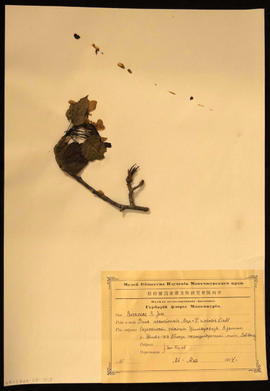Rosaceae B. Juss. Prunus padus L. Plant specimen collected by N.E. Hansen, 1924, also known as bird cherry, hackberry, hagberry, or Mayday tree, is a species of cherry, native to norther Europe and northern Asia. N.E. Hansen (1866-1950) was a Danish-American horticulturist and botanist who was a pioneer in plant breeding. Hansen came to South Dakota in 1895 and became the first head of the Horticultural Department of South Dakota State College. He also served as agricultural explorer for the United States Department of Agriculture. He searched for hardy grasses, fruits, and other plants throughout Europe and Asia and brought them back to the United States to raise or crossbreed with American varieties to produce hardy plants. Specimen is mounted on an 11.5 x 16.5 inch herbarium sheet accompanied by a label with hand-written notation in pencil ink.
Elements area
Taxonomy
Code
Scope note(s)
- topic
Source note(s)
Display note(s)
Hierarchical terms
Pears
Equivalent terms
Pears
- UF Pear
- UF Pear tree

